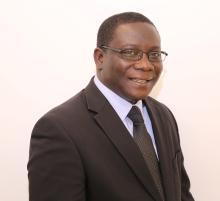Brief History of the Centre
The past 3 decades has seen a paradigm shift in scientific research and Evidence Synthesis (Systematic Review) has emerged as the approach for producing best and reliable (‘gold standard’) evidence upon which sound decisions and policies can be based. Whilst working in Europe, I realized, despite the growing demand and value for high quality evidence, the capacity in evidence synthesis was virtually absent or less developed in countries across Africa. This led to an inner feeling of moving to Africa to help develop capacity in this area where trainees will be sensitive to quality evidence as the pivot for sound decisions and policies across countries in Africa. Following up on this, I applied to the University of Ghana for a faculty position to enable me to champion this course. I was given appointment in 2012 and I relocated to Ghana in 2013.
First, through the support of the Dean of the School of Public Health, a course I had developed got into the Doctoral curriculum. Then followed the Centre for Evidence Synthesis and Policy, University of Ghana which was set up to train faculty members through Train-The-Trainers capacity building workshop, then scientists including principal investigators (PIs) and Co-PIs, mid-career scientists, next generation scientists, PhD students and Post-doctoral fellows, university lecturers, health professionals and policy makers how to generate and use the best evidence. The core mandate of CESP-UG has been to advance innovative, evidence-informed, demand-driven, policy-relevant and context-sensitive research in Africa, and to translate research into evidence-based guidelines. The CESP became a member of the Global Evidence Synthesis Initiative (GESI) Network. There has been an extension of our capacity building initiative to now train institutions that are interested methods for generating the best evidence and translation of evidence into sound policies.
Achievements
The Centre for Evidence Synthesis and Policy has, in collaboration with Africa Communities of Evidence Synthesis and Translation (ACEST), trained over 600 Ghanaian specialist doctors and consultants in Evidence-based Medicine (EBM) through the Ghana College of Physicians and Surgeons to help strengthen the health system and healthcare delivery by further refined training that will lead to improvements in patient outcomes. Over 500 Postdoc fellows, PhD and other postgraduate Students as well as university lecturers, principal investigators (PIs) and Co-PIs in Ghana and other African countries in systematic review and evidence-based research, which have shown remarkable preliminary impact. The Evidence Synthesis Centre is helping in the setting up of centres of excellence in other African countries.
The sources of funding
We have operated without any financial support for the last 10 and over years. This was the result of a key decision I made to grow the centre in-house so that it could resist attempts by funders to dictate the terms of reference and direction of the Centre’s core mandate and activities. The other prong of this was to test whether innovative ideas conceived by African scientists or entrepreneurs always needed external support to make it work. Financial support received so far came from USAID, TIBA (Tackling Infection to Benefit Africa) and the Ghana College of Physicians and Surgeons when the Centre organized capacity building training workshops for them, on request. We believe that the Centre is now grounded and ready to move to the next phase where it will solicit external financial support to help meet the next targets.
Capacities needed to set up and run a Centre
The most important skill needed was an expert knowledge in the specific area the Centre is focusing on - expert knowledge in how to generate the best evidence and translate it into evidence-based policy and practice. These are skills that are developed over long period of time. For example, I conducted my first systematic review and meta-analysis in 1996 and it took nearly 10 years to fully ground myself in issues in evidence synthesis and translation that would enable me to confidently train others. For those in Africa who would like to set up Centres in their universities or institutions, it is strongly recommended that they go through our train-the-trainer Programme, also learn how to prepare systematic review.
Challenges faced in running the Centre
The main challenge was how to sell the idea to authorities who could make things happen but did not have any knowledge about the concept I wanted to sell to them. This led to the development of a clear concept note that detailed the Centre’s mission, vision, short and long-term objectives and the anticipated impact. The anticipated impact component was crucial. It should be re-emphasized that it requires a lot of effort and time to train fully competent persons who could support the Centre’s activities. This is the part that frustrated the most and couldn’t be fixed easily. We are still working developing capacity and being persistent. and exercising considerable. In my case, one of the biggest challenges was lack of funds to start with. Patience and resilience have helped so much.
Experience gained and lessons drawn
The biggest experience or lesson learned is, not everyone will buy into your idea, even if it is the best and so convincing. You should be prepared those who would like to use their positions to kill the vision, but don’t give up, be persistent, work hard and have a lot of patience.
How has the presence of the centre in Ghana impacted evidence generation and use?
The setting up of the UG Evidence Centre in Ghana has led to sensitization of academics, researchers, health professionals, policy makers, even patients on the value of quality evidence as key in informing decisions and choices. The vast majority in Ghana are aware of the value of systematic review and the need to promote its production and use. Most universities in Ghana for the first time have allowed students at the Masters level to do systematic reviews for their theses. At the PhD level too, some supervisors have started to allow their students to incorporate systematic reviews as key component of their students’ thesis to improve quality, a case persistently made the UG Evidence Centre. These have led to a new wave of systematic review preparation, although most are in preliminary stages. Some have published their systematic reviews in peer-reviewed journals though. Also, Ghana is the first country in Africa (to the best of our knowledge) where a move has been made for the practice of Evidence-Based Medicine and made it mandatory in the training of doctors at the specialist and fellowship levels. This is being extended to the West African College of Physicians and Surgeons.
A pooled analysis of training ran by UG Evidence Centre showed that only about 5% of participants who participated in our training programmes for the first time said they had some knowledge in systematic review at the start of the training. The results also showed that almost all participants (100%) said they gained a considerable knowledge that will help shape the way they do things moving forward, doing things differently and better after the course. We are in the process of evaluating the impact of our Evidence-based Medicine training Programme to assess impact on the practice of specialists and fellows trained, and ultimately, patient outcomes. We will make our results widely available when ready.



